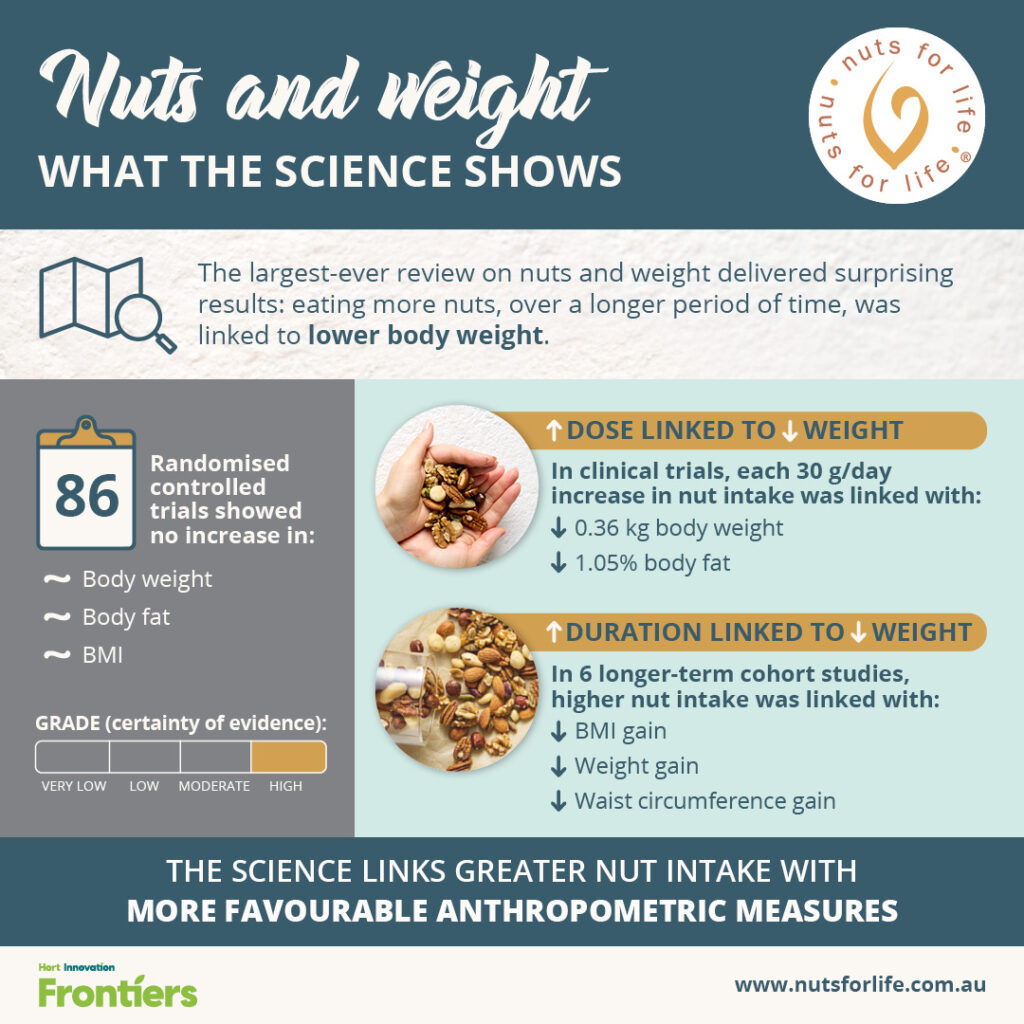
Mental health research
The body of evidence about nuts and mental health continues to grow, with new local and international research papers regularly…

Research consistently shows that nuts do not lead to short-term weight gain and support better weight management over the long term (1). Despite this, concerns about nuts contributing to weight gain persist among both the public and some health professionals.
It’s time to set the record straight.

Convincing evidence shows that nut consumption does not increase body weight.
The largest and most comprehensive systematic literature review (SRL) on nuts and body weight included 86 randomised controlled trials (RCTs) and six prospective cohort studies (1). A meta-analysis (MA) was conducted, and the certainty of the evidence was assessed using the Grading of Recommendations Assessment, Development, and Evaluation (GRADE) tool.
The 86 RCTs in this review had a median study duration of eight weeks.
Table 1: Summary of the findings from the SLR and MA of 86 RCTs
| Evidence statement | Certainty in the evidence |
| Nuts do not increase body weight, BMI or body fat | High |
| Nuts do not increase waist circumference, waist-to-hip ratio, or visceral adipose tissue | Moderate |
High-certainty data from RCTs confirm neutral weight effects when nuts are added to the diet, even without calorie offsets.
Seventeen other SLRs have also explored the relationship between nut consumption and body weight in the short-term. All the findings have been consistent: that nuts do not increase body weight.
This includes:
Did you know? There’s a six-fold difference between ‘actual’ and ‘target’ nut intake – which is the largest shortfall of any food group (8). Fear of weight gain, due to concerns about the energy content of nuts, is a major barrier to consumption (9).
Long-term studies show that people who eat nuts regularly gain less weight over time.
A MA, of six prospective cohort studies (which had a median follow-up duration of 18 years), found nuts were linked with a 7% lower incidence of overweight/obesity (1). The certainty of this evidence using GRADE was ‘moderate’.
In these long-term studies, higher nut intake was linked with:
These results are supported by an earlier SLR (10), which showed higher nut intake was associated with less weight gain and a lower risk of overweight/obesity.
The largest ever review on nuts and weight found eating more nuts, over a longer period, was linked to lower body weight (1).
Higher nut intakes are linked to modest reductions in body weight and fat mass.
The effect of nut portion size has recently been investigated in a SLR and MA (1).
Looking at the RCTs within this review, researchers conducted a sub-analysis by dose to compare intervention studies with <45.5g of nuts, to those with ≥45.5g. This showed significant differences between sub-groups for body weight and BMI, with increased body weight and BMI in studies with smaller nut doses (<45.5g).
Taking this a step further, the researchers also conducted a meta-regression to analyse the link between nuts and portion size across the full range of nut intakes.
In the RCTs, each 30g per day increase in nut intake was linked with:
In the prospective cohort studies, people who had higher intakes of nuts had a lower risk of developing overweight/obesity, were less likely to gain 5 kg or more of weight and had lower increases in waist circumference over time.
Across all studies, there was no strong evidence of a ‘tipping point’ when it came to very large portion sizes of nuts and weight increases. Even in individual studies providing 100g of nuts per day (>3 handfuls), no weight gain was reported.
Research consistently shows that eating nuts does not lead to weight gain. Even larger servings (100g or around 3 handfuls a day) do not increase weight. And long-term studies show that people who eat nuts regularly have a lower risk of becoming overweight or obese.
Health professionals can use this evidence to counter outdated ‘nut-calorie-weight’ concerns – recommending at least a handful of nuts a day, including for weight-conscious clients or patients.
Did you know? An umbrella review, published in 2025, on food groups and body weight, reinforced that nuts promote healthy weight and sit alongside whole grains, legumes, fruits, and vegetables when it comes to food groups that support body weight outcomes (11).
Published August 20, 2025
Be sure to follow us for great recipes,
Nut inspirations and fun facts
For up to date information & the latest research articles